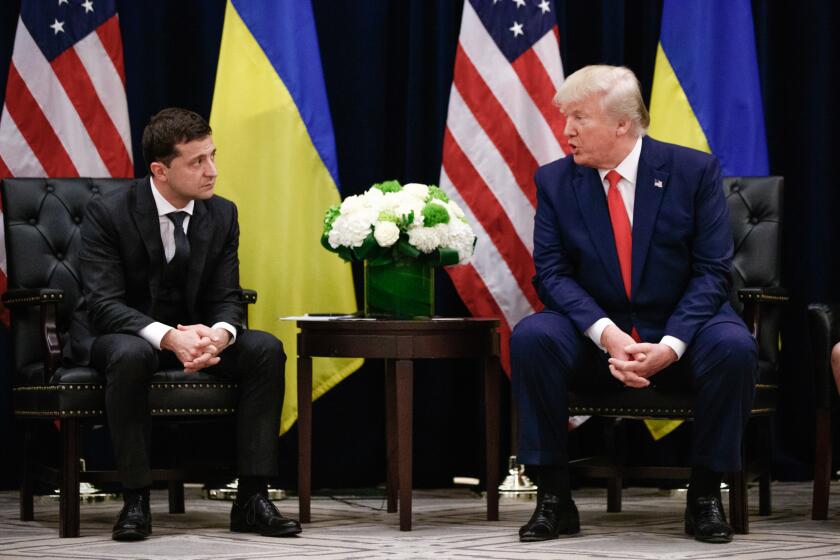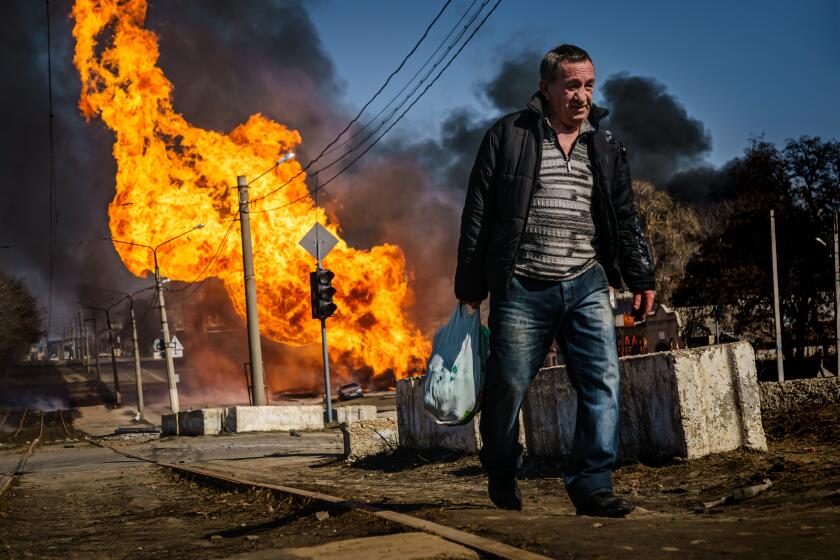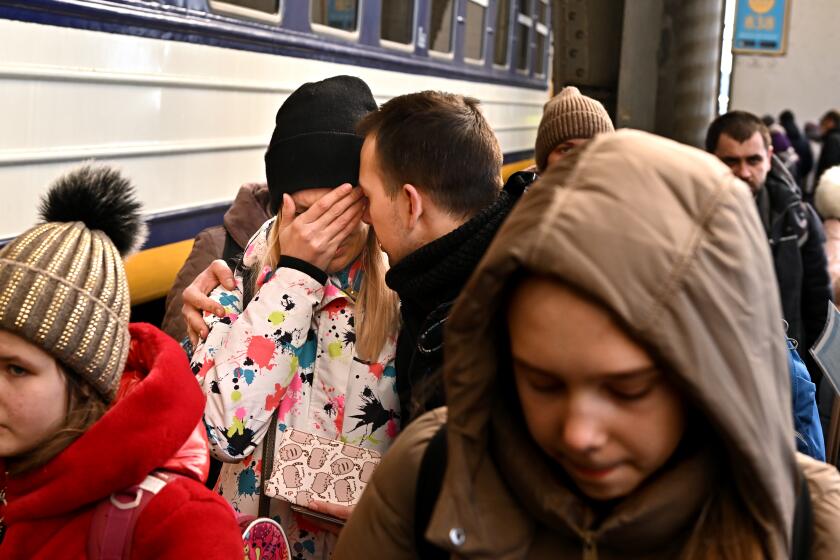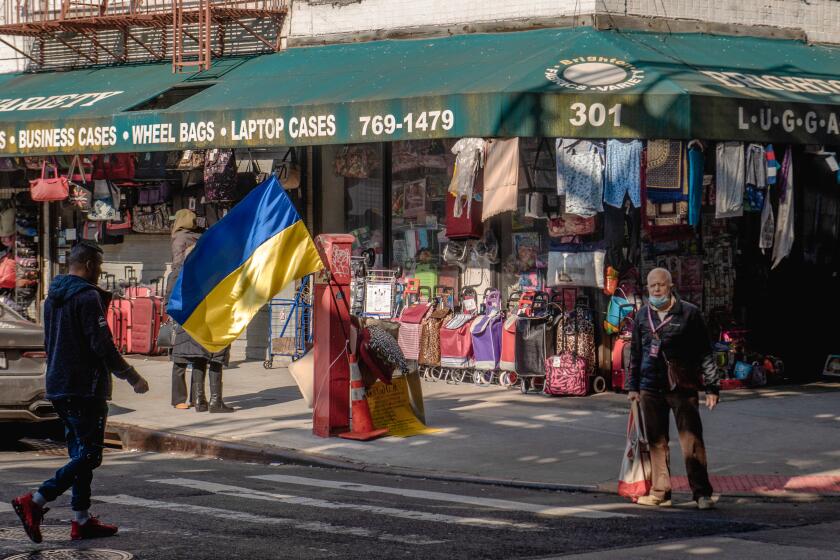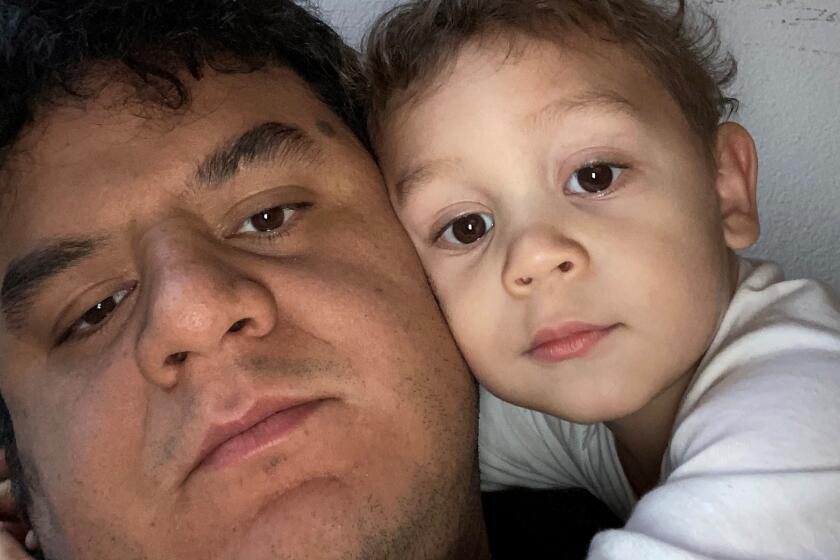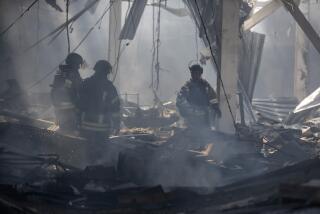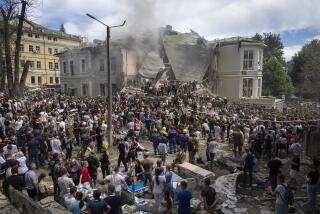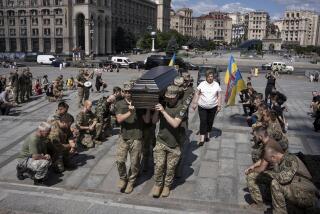Global outrage grows over Putin’s merciless attacks in Ukraine
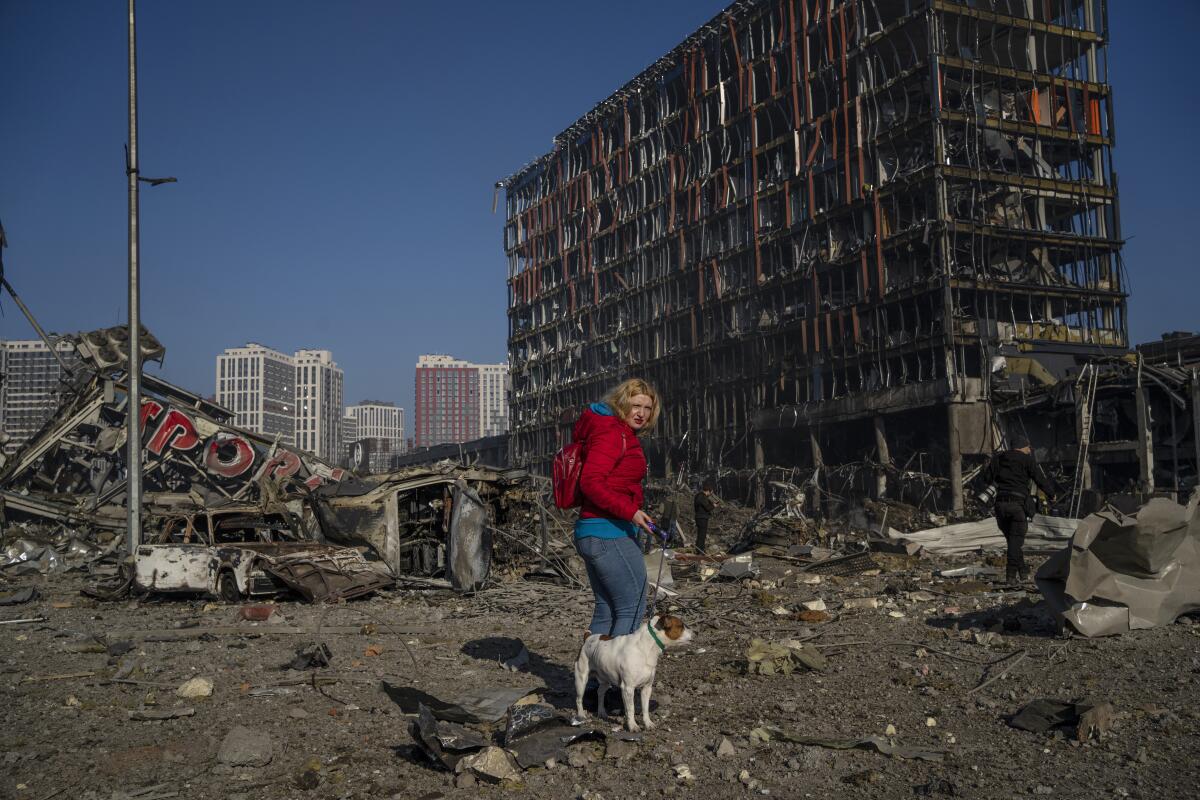
LVIV, Ukraine — International outrage mounted Monday over medieval scenes of suffering in Mariupol, a strategic southern port city that has defied demands for surrender despite a ferocious Russian siege that Ukrainian officials say has trapped thousands of civilians and left corpses lying in the streets.
As Russia’s devastating onslaught in Ukraine neared the one-month mark, Ukrainian President Volodymyr Zelensky said Moscow was apparently willing to lay waste to the entire country to force his government to capitulate — something he declared that he and his compatriots could not do.
In the capital, Kyiv, wreckage still smoldered Monday after a major shopping mall was hit by missiles Sunday, killing at least eight people, according to Ukrainian officials. In the Black Sea port of Odesa, authorities said residential buildings in an outlying area were set ablaze by airstrikes.
Seeking to present a united transatlantic front in the face of Europe’s biggest ground battle since World War II, President Biden spoke by phone Monday with the leaders of Germany, France, Britain and Italy about what the White House called Russia’s “brutal tactics” in Ukraine.
The president, accompanied by Defense Secretary Lloyd J. Austin III, was to attend an emergency NATO meeting Thursday in Brussels, and on Friday visit the front-line state of Poland, which is coping with an enormous wave of war refugees.
The war’s savagery — and its evocation of past horrors on the European continent — was encapsulated in an announcement Monday, from a German memorial foundation, that a 96-year-old survivor of three World War II concentration camps, Boris Romantschenko, had been killed in shelling in Kharkiv on Friday. The foundation said family members had informed them of Romantschenko’s death, which came amid what has been weeks of relentless bombardment of the northeastern city.
Western analysts and officials increasingly believe that the invasion that began Feb. 24 has become a bloody war of attrition, with Russian President Vladimir Putin frustrated by his forces’ failure to subdue large cities like Kyiv and Kharkiv, the country’s second-biggest metropolis, even as they have seized sweeping sections of the country’s south.
Russian bombardment of densely populated civilian areas, including targets such as schools and hospitals, has become increasingly indiscriminate, Pentagon spokesman John Kirby told reporters Monday. That tactic has been used to horrifying effect in Mariupol, on the Sea of Azov, whose capture would be key to establishing a Russian land bridge to Crimea, the peninsula Putin seized eight years ago.
Ukrainian officials rejected a Russian proffer of evacuation routes for Ukrainian troops if they left the city by Monday morning — even after the reported bombing of a local art school where officials said hundreds of people had taken shelter.
The commander of the Azov regiment, Maj. Denis Prokopenko, said at least 3,000 people had died in the encircled city, where food, clean water, medical supplies and power are all but nonexistent, but that the true toll was impossible to determine.
“No one can say the exact number of dead, because people are buried in mass graves, without names. Many bodies remain on the streets without burial. Some people remain under the obstruction, buried alive,” he said.
“This is a war crime, a massive war crime, what’s happening in Mariupol,” the European Union’s top diplomat, Josep Borrell, said Monday in Brussels.
Zelensky, in bleak remarks reported Monday by a Ukrainian public broadcaster, said his government and people “cannot fulfill Russia’s ultimatum,” because it would mean “we must all be destroyed.”
“For example, give away Kharkiv, Mariupol, or Kyiv — neither the people of Kharkiv, nor the people of Mariupol, nor the people of Kyiv, nor I, the president, can do that,” he said.
The New York-based group Human Rights Watch on Monday cited desperate conditions in Mariupol, whose residents “have described a freezing hellscape riddled with dead bodies and destroyed buildings,” said Belkis Wille, senior crisis and conflict researcher for the group. “And these are the lucky ones who were able to escape.”
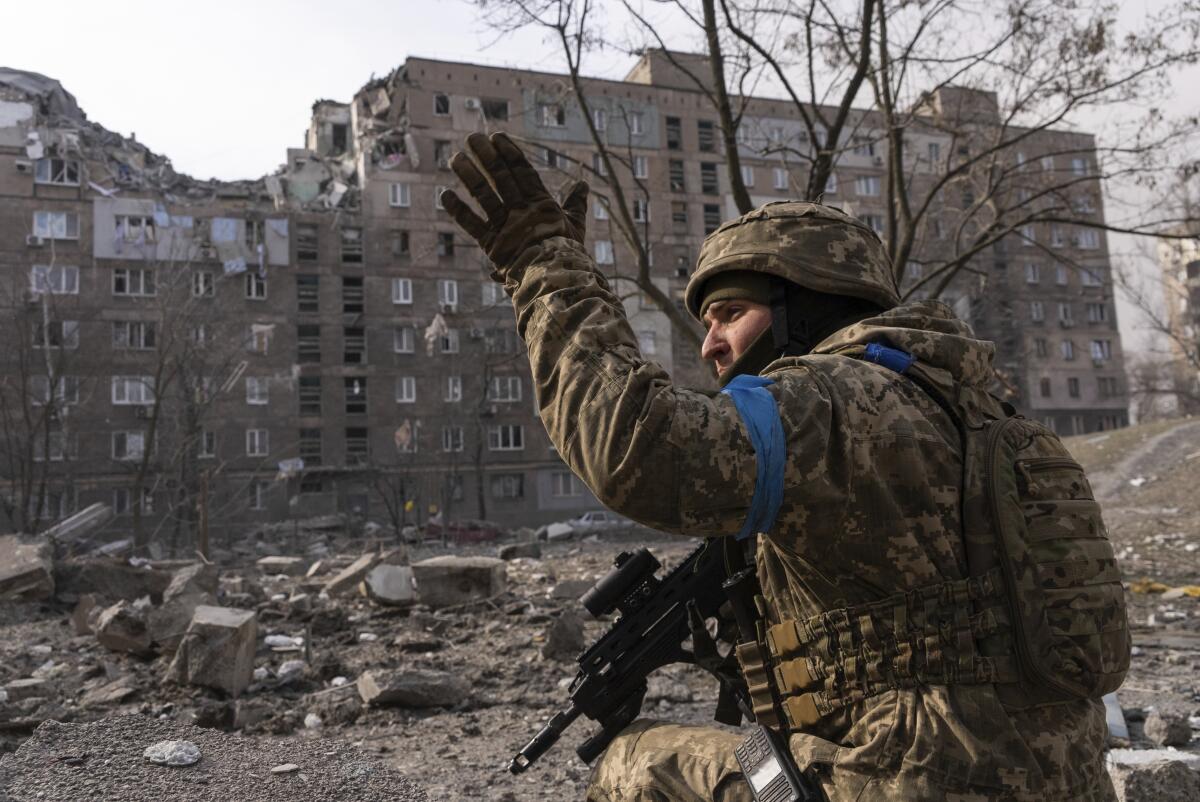
In an overnight address, Zelensky said the bombing of the art school, where he said 400 people had taken refuge, was further proof against Russian claims that it’s not targeting civilians.
“There were no military positions,” Zelensky said. “They are under the debris. We do not know how many are alive at the moment.”
The former president attempted to extort Zelensky for political favors and made Ukraine a pawn. Putin took note.
The refugee crisis set off by the war, meanwhile, has reached staggering proportions. More than 3.4 million people — about 1 in 13 — have fled the nation, according to the United Nations. Millions more have been internally displaced, with many jamming trains and buses bound for western Ukraine, which has seen significantly fewer attacks than the east, where the war began.
The United Nations reported Monday that more than 900 civilians have died, though the actual number is probably much, much higher.
With Kyiv still under Ukrainian control, the Russian military has resorted over the last week to shelling residential areas outside the center of the city, with missiles regularly hitting high-rise apartments and commercial strips. Some are direct impacts from Russian launches. Damage to at least one high-rise building last week was the result of a Ukrainian attempt to intercept fire.
The Times’ Marcus Yam, no stranger to war photography, gives a first-person account from Ukraine.
Late Sunday, the Ukrainian emergency service reported that missiles struck a shopping center in the Podilskyi district, northwest of the central Kyiv, partially destroying it. At least eight people were killed, according to the Ukrainian emergency service.
Mayor Vitali Klitschko said that houses were also hit.
“Several explosions in the Podilskyi district of the capital. In particular, according to information available at the moment, shells hit some houses and one of the shopping centers. Rescuers, medics and police are already there,” Klitschko said on his Telegram channel.
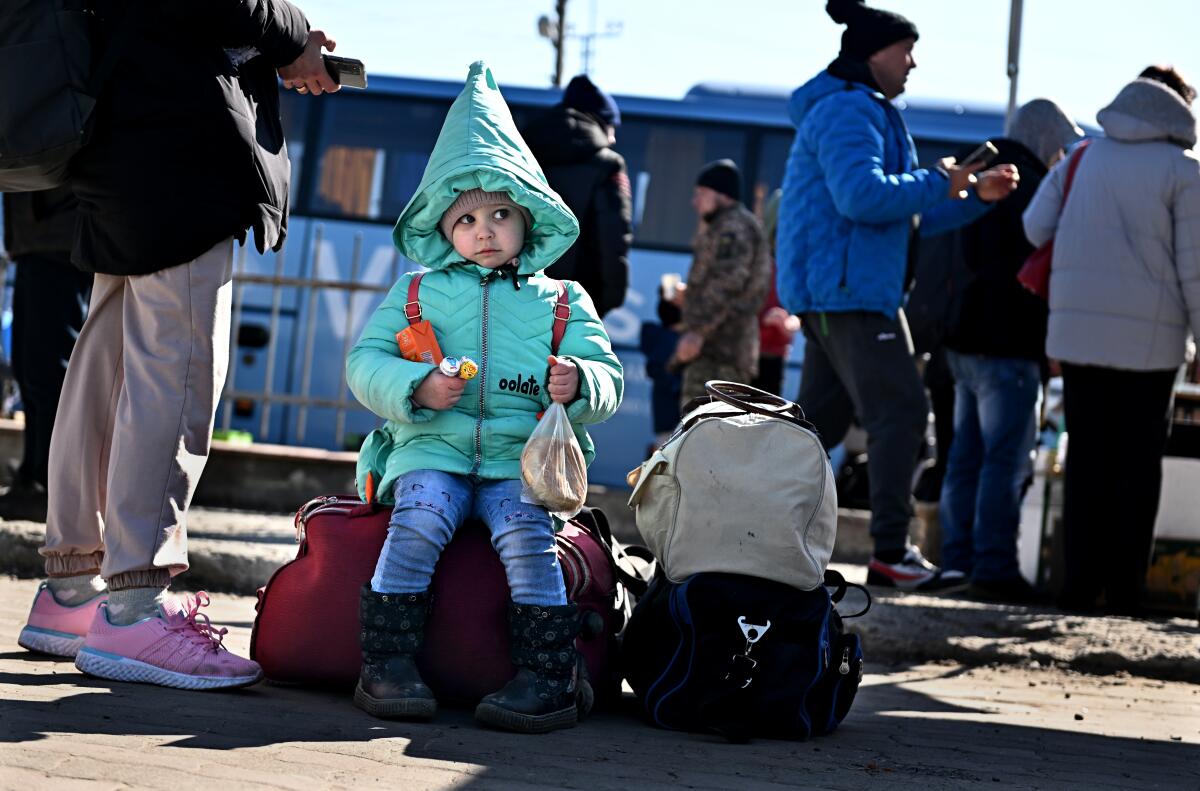
The shopping center, called Retroville, had fast food restaurants — including a KFC and McDonald’s — a movie theater and a gym, among other businesses. According to a Facebook post, it had shut down last month as the war began. It’s unclear if it was operating this week.
Amid the barrage of attacks, the city will undergo another 35-hour curfew, from 8 p.m. Monday until 7 a.m. Wednesday. Klitschko said that pharmacies, gas stations and stores would be closed all day Tuesday and that only emergency vehicles would be allowed in the streets during the curfew.
“I ask everyone to stay at home or in shelters when the alarm sounds,” Klitschko said.
Some 3.2 million Ukrainians have fled the war, and they keep on leaving. Most men stay behind, leading to crushing separations.
A similar curfew was imposed last week at what Klitschko called a “dangerous moment” for the capital.
A British intelligence assessment said Monday that Russian troops were likely to continue to encircle and attack areas around Kyiv. The capital is Russia’s “primary military objective,” said the analysis from Britain’s Ministry of Defense, which estimated Russian forces to be about 15 miles outside Kyiv.
Brooklyn is home to 123,000 Russian speakers, many in Brighton Beach. Since Russia’s invasion, support for Ukraine has blossomed, as has some tension.
Ukraine also released a statement Monday accusing Russians of kidnapping thousands of children in the eastern region of Donbas and taking them to Russia. In a statement, the spokesman for the Ukrainian foreign ministry, Oleg Nikolenko, said 2,389 children were taken from their parents Saturday. The information could not be independently confirmed.
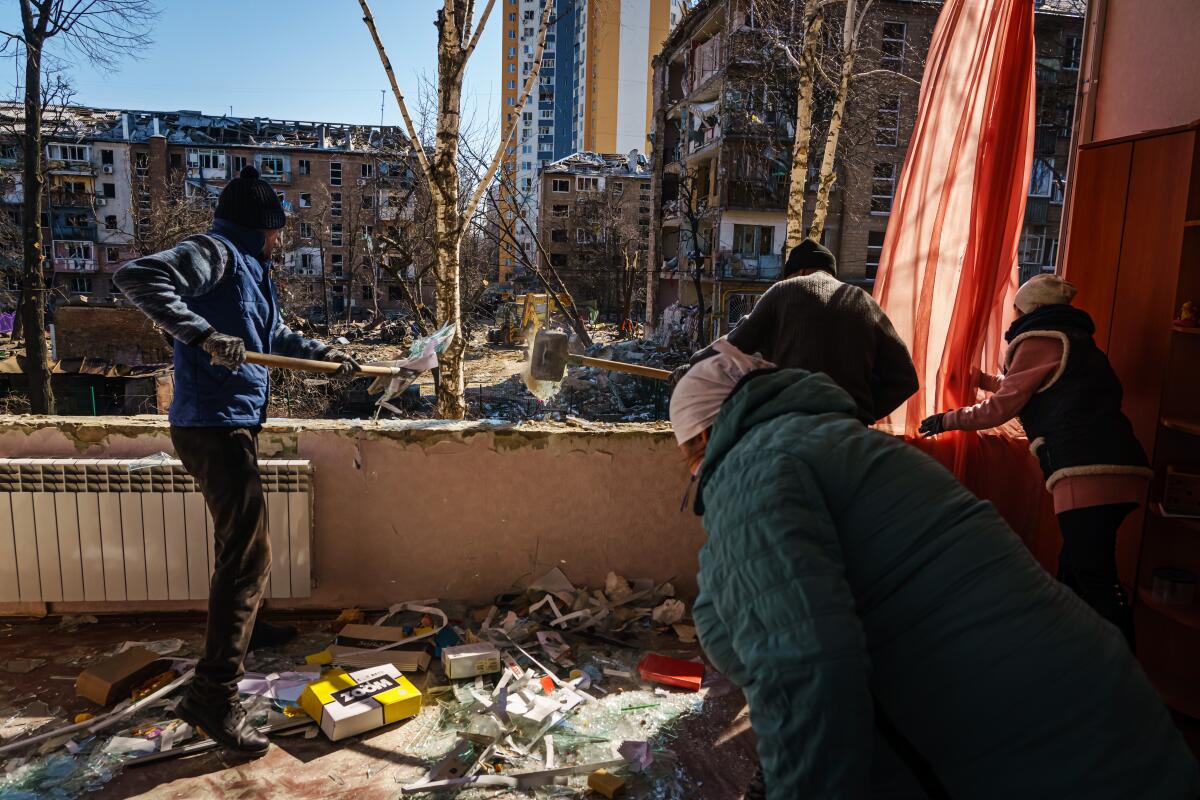
In the western city of Lviv, a relative haven from the violence, life continued at a normal pace Monday despite fears that Friday’s bombing of a decommissioned aircraft repair facility adjacent to the city airport augured a new front for Russian attacks. It was the first strike within the city limits, and authorities said one person was injured.
On Sunday, people crammed the streets of Lviv, where the population has increased dramatically because of a flood of displaced people. Beneath sunny skies, cafes and parks were packed. But city officials continue to regularly sound air sirens and warn residents to remain vigilant.
Breaking News
Get breaking news, investigations, analysis and more signature journalism from the Los Angeles Times in your inbox.
You may occasionally receive promotional content from the Los Angeles Times.
Cesar Quintana’s son was taken by his estranged wife, who fled to her home country, prosecutors say.
While the death toll continues to climb, Zelensky has said he wants to enter direct negotiations with Putin. “It’s time to meet, time to talk,” Zelensky said over the weekend.
On Monday, Kremlin spokesman Dmitry Peskov rejected the idea.
The progress in negotiations so far is “not what we would like and not what the dynamics of the situation require from the Ukrainian side in order to talk about a meeting between the two presidents,” Peskov said, according to Russian state news agency Tass. “They would not have any agreements to commit to.”
Also Monday, Russia’s ministry of foreign affairs said the U.S. envoy in Moscow, John Sullivan, had been summoned and warned that Biden’s depiction last week of Putin as guilty of war crimes had taken relations with Washington to “the verge of rupture.”
Biden, answering a reporter’s question, said he thought the Russian leader was a war criminal. The White House later clarified that Biden was speaking “from his heart” about the atrocities the world has witnessed, but that a legal declaration to that effect had not been made.
McDonnell reported from Lviv, Kaleem from London and King from Washington, D.C. Times staff writers Marcus Yam in Kyiv and Tracy Wilkinson, Sarah D. Wire and Noah Bierman in Washington contributed to this report.
More to Read
Sign up for Essential California
The most important California stories and recommendations in your inbox every morning.
You may occasionally receive promotional content from the Los Angeles Times.
